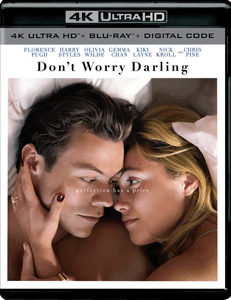Florence Pugh is so firmly one of my favorite actors that I think I could watch her clean her house for 2 hours. “Don’t Worry Darling” tests that theory. It’s unfair to say that’s literally all her character, 1950s homemaker Alice, does in the film.
But director Olivia Wilde and writer Katie Silberman’s second collaboration – following the similarly not-as-good-as-it-thinks-it-is “Booksmart” – is slow to develop. And it’s not particularly interested in developing any character other than Alice in this planned desert community, which is like one of those nuclear-bomb test towns except with real people instead of cardboard cutouts.
Still, I’m with Pugh till the end. I feel bad that Alice has no friends she can trust, and I want to bust through the screen and comfort her.
“Don’t Worry Darling” (2022)
Director: Olivia Wilde
Writers: Katie Silberman (screenplay, story), Carey Van Dyke (story), Shane Van Dyke (story)
Stars: Florence Pugh, Harry Styles, Chris Pine
Stepford-ville?
The fact that everyone other than Alice is pastel-colored and robotic is the point. We’re supposed to wonder if they are robots. Daily life moments like the men driving off to work at the mysterious nearby Victory Project are soundtracked by Fifties pop tunes in a way we’ve learned to associate with secret horrors.
When moments are truly ominous, the soundtrack gives way to creepy bass sounds. Another pretentious 2022 SF film, “Nope,” also slathers on this mood-building device. Sometimes it’s not merely non-diegetic sound; it’s rumbles from the Victory Project facility.
“Don’t Worry Darling” is obviously a “twist” film. We can tell by the setting and the quick-cuts from one purposely cliched scene (a homey breakfast, a dance class) to another that we’re supposed to furrow our brow and ask “What’s really going on?”
In a way, it gives us the twist right away; no viewer will think this truly is a 1950s planned community. That’s OK if there are lots more twists. (Check out “Barbarian” to see this approach used effectively.) Ultimately, while “DWD” does deliver some answers, it’s not the thrilling ride of revelations it could have been.
“DWD” has a vibe of being full of itself. Without Pugh, it would’ve been too slow-developing to sit through. Still, it’s an interesting film to discuss, so I’ll do that after this SPOILER ALERT.
OK, so what’s the answer? (Spoilers)
Is “DWD” borrowing from “Time Out of Joint”? From “The Stepford Wives”? From “The Truman Show”? From the “X-Files” episode “Arcadia”? From “The Village”? From “Westworld”? From “Last Night in Soho”? All these books, movies and TV shows flashed through my mind.

I settled on “they’re robots,” but I guessed wrong. Rather, Silberman and Wilde are riffing on “The Matrix”! This is surprising considering how hard and fast “The Matrix” fell out of favor with last year’s “Matrix Resurrections.” Granted, we don’t know this is a virtual world with real people plugged into it until the final act. And given its lavish budget, “DWD” was perhaps in development concurrent with that fourth “Matrix” film.
Setting “DWD” somewhat apart is the reason why Alice and the others are plugged in. It’s not because the humans lost a grand long-ago war, it’s because they are part of one man’s (Chris Pine as Frank) project.
People go through “Clockwork Orange” brainwashing, then jack into this virtual town, where they are represented by their avatar. The “why” is basic: They don’t like the real world of 2022. Making things darker, but also jarringly regressive, Alice’s husband Jack (Harry Styles) has forced Alice into this Fifties-themed virtual reality; it wasn’t her choice.
“DWD” implies that every woman in this town – except Wilde’s Bunny, who wants to live with her NPC kids, since they died in the real world — was forced there by their husband.
Those crazy men (Spoilers)
We never learn what the men do at the Victory Project. Perhaps they work to keep the VR itself going, making for a tidy closed loop. Instead of a loop it’s a plot hole, because Jack has no apparent tech background; in the real 2022, he’s a whiny layabout.
Alice was a surgeon (!) but inexplicably she and Jack are nonetheless poor. He bristles at her choosing work over him. In the climactic showdown, he says he thought she’d be happier as a housewife. Viewers know this is not true even before Alice delivers the requisite rebuttal that she liked being a surgeon.
“DWD” suggests men think (or fool themselves into believing) women are meant to be homemakers, and would be happier doing it. This is such a regressive, 20th century notion – so out of touch with how the majority of modern men think – that it makes “DWD” shocking. But not in a good way.
Considering that the practical workings of the Victory Project go unexplored, and that the supporting cast is mostly robotic, “DWD” is a theme movie. How the male characters view the female characters is the reason for the film’s existence.
That makes “Don’t Worry Darling” more of a head-scratcher than a brain-teaser – a 2022 movie that would’ve been groundbreaking if it was released 60 years ago. But still, it is 2 hours of watching Florence Pugh do stuff.

